siberia
Trans-Siberian Railway - Leaving Siberia
From the moment we arrived in Yekaterinburg, Russia, I had the song "The Cold Part" by Modest Mouse playing in my head, which is a dark and desolate song that sings "so long to this cold, cold part of the world". I don't think the city is as cold and dark as I chose to display in the video, but I do think the video fits with the soundtrack that was playing in my head at the time.
The scenes at the end are from our homestay in Yaketerinburg. We stayed with a local named Eleana for two nights in former Communist housing blocks. She was nice, but was caring for a friend who was sick at the time and we have both become ill after staying with her. The housing was warm on the inside, scary on the outside.
Yakaterinburg is famous for the deaths of the last czarist family in Russia, the Romanovs, who were killed in a cellar in the city by the Communist Revolutionaries as a symbol of the end of their imperial rule. A sad and controversial story.
Yekaterineburg is at the imaginary border between Asia (and Siberia) and Europe, so the song even fit as we left...
so long to this cold, cold part of the world
Video: Trans-Siberian Railway - The Vodka Train
It is a Trans-Siberian right of passage - drinking vodka with Russians on a train in the middle of Siberia. This video shares a few of the moments I'll never forget and a few that I can't really remember.
Read the story from this night
Too Much Vodka with the Russian Locals
Given the opportunity, we will choose to hang out with the locals and in nearly every instance. The vast majority of the time, it has been a rewarding and interesting experience. However, on the Trans-Siberian Railway we’ve learned that there are Russian locals that you don’t necessarily want to “experience” for 2 days on a train.
Peer pressure is an issue on the Trans-Siberian train with consistent reminders from other travelers that this is the “vodka train” and you must drink Russian vodka. This pressure is lost on the Russian locals though as they need no pressure whatsoever to drink on a train. It is a requirement for them and when mixing with foreign travelers the requirement is shared by all.
So we found ourselves in the dining car on the second night of a 48 hour journey from Irkustk to Ekaterineburg.
Between Slava, the gigantic ex-Russian Army captain with bullet wounds and Victor, the pudgy Belushi-esque ex-Mafia family man, we had our hands full. While our English friend Paul was busy being pressured by Slava into drinking more vodka than he wanted, I got a dose of vodka with Victor and his fellow Russian friends, who seemed to be complete blockheads. We drank more, became friends, toasted to health, arm wrestled and looking back I can say that I have never witnessed so many scars on so many people. I think these guys have had a hard life.
For some reason I accepted Victor’s invitation for me and Sachi to come to his room and drink more vodka. Not only did this end up with me losing a few hours of memory, but it caused Sachi to end up babysitting Victor’s Coke-spewing 4 year old child “Sergei” for over an hour. She was not happy and I had no idea why. What I did remember was Victor telling me at some point in the night that the wolf tattoo on his arm was from his 3 year prison term. Apparently had “only killed one person” while in the Russian mafia. Had I had my wits about me, I may have escaped at that point, but I didn’t.
The next day I awoke to a hangover, an upset wife and a half-drunk Russian ex-con banging on the door at
Later Victor hooked back up with the Blockheads and they formed a roaming band of drunk-in-the-morning Russian annoyances. They went from one end of the train to the other, peer-pressuring everyone from the night before to drink with them. One of them even forced his way into the compartment of understandably shaken American and Canadian girls. He would later be quite accurately called a stalker.
This band of drunks eventually caused the revelers from the night before to close their doors and hide out for the majority of the morning. Many, including Sachi and I ignored knocks at our doors. The foreigners on the train tried to memorize compartment numbers so we could visit one another without keeping a door open. There was talk of passwords being used. We were held hostage by the locals.
By about
Watch the Video Here.
The Siberian Village of Bolshoe Goloustnoe
We were greeted in the "Siberian Capital" of 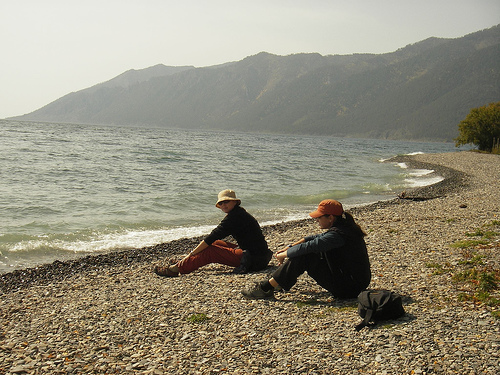
The tiny
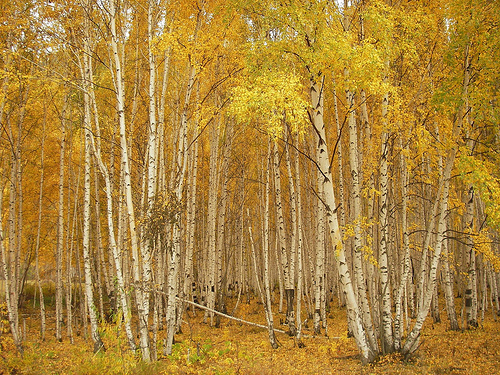
For the first time since visiting small villages in
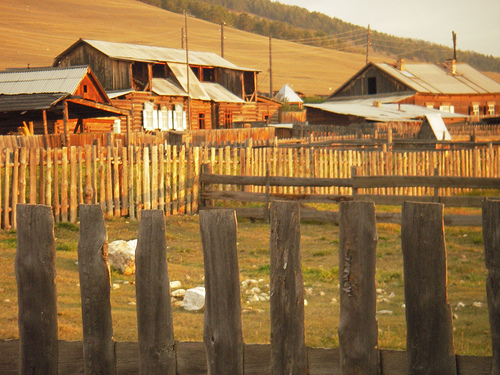
The town on the South Eastern shores of
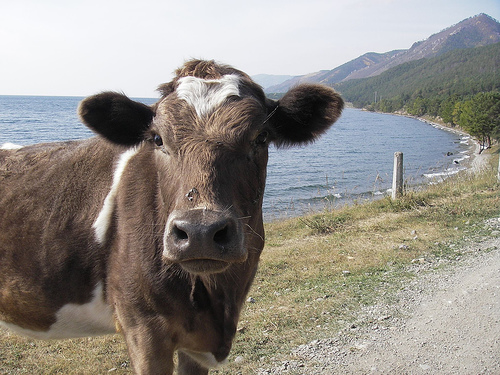
The homes themselves are remarkably similar, with dark wood and ubiquitous, but unique window dressings called Siberian Lace. The Siberians believe in spirits who are able to enter homes through windows and the windows are designed to prevent the spirits from entering. The windows are colorful works of art that beg for photos and appear too good to be true. If they were plucked from this Siberian location and appeared in a city, you could imagine flag-bearing tour groups ooohing and aaahing at the traditional designs. Yet, here they are surrounded by gardens, livestock and splashed mud. These windows are an example of the reality of travel that I long to experience.
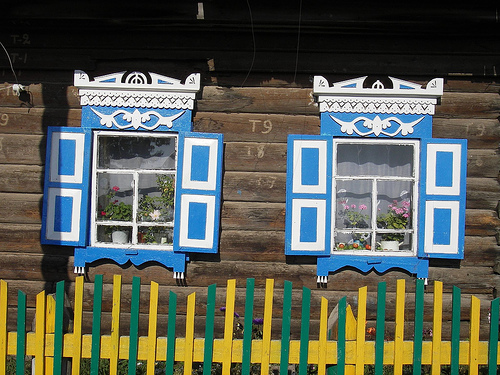
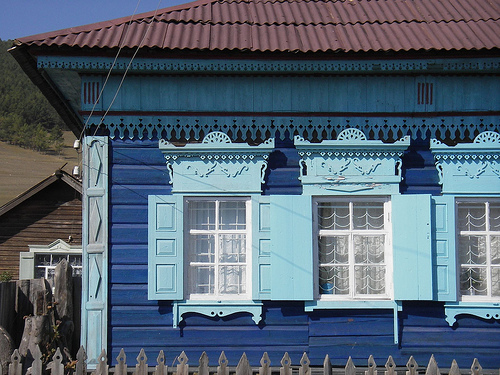
Another Siberian experience is the use of a “banya” or sauna. The tradition works like this… The banya is prepared by building a fire in a furnace-like compartment of a small wooden structure. The fire heats water that is used for bathing and the “sweat room” where you sit naked and relax. I have decidedly mix reactions to the sweat room. I don’t like heat and I already sweated enough for 5 years in
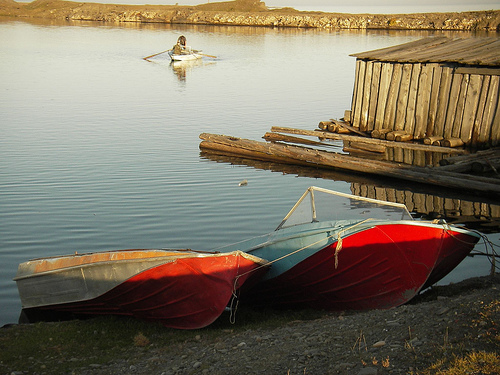
Bolshoe Goloustnoe, more than any other village we’ve visited on the whole trip, seemed to take us back in time. Here are a few examples.
- The toilets are located outdoors and over a deep pit in the earth near the garden. When it fills up, they cover it and dig another hole. Yes, despite pulling fresh, clean water from an aquifer that is associated with the lake, the homes in the village do not have running water.
- Only a few weeks ago mobile phone service arrived in the village. Prior to that, the only phone in the village existed in the Post Office and even it was often in disrepair.
- The village does not have Internet access.
- The villagers are very curious about foreigners, described as a look at someone from another world.
- Few vehicles exist in the village and some of the old-timers have never left the village in their lives.
- Many of the farmers in Bolshoe Goloustnoe are subsistence farmers, growing food to eat rather than sell.
- The village lacks tourist infrastructure – no restaurants or souvenir shops.
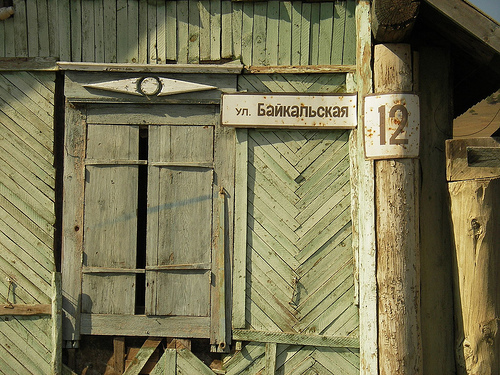
I didn’t realize it until we arrived, but
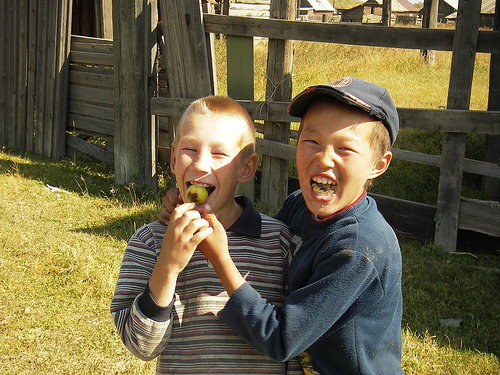
We didn’t expect it, but Bolshoe Goloustnoe and 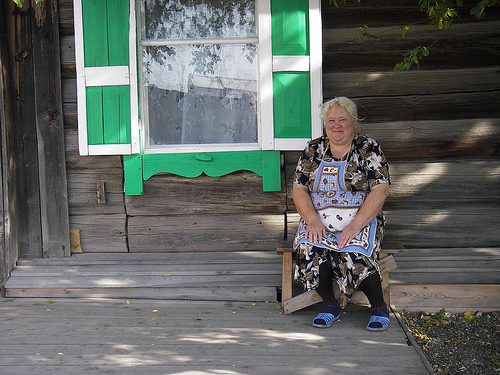
Video: Incredible Lake Baikal, Russia
To look at Lake Baikal doesn't do it justice - it is just a big lake in a beautiful and peaceful setting. Only by learning a little about it can you appreciate what a special place on the Earth it really is. You can learn more via Wikipedia too.
Music: Yo La Tengo - You Can Have It All




Recent comments
8 weeks 6 days ago
9 weeks 2 hours ago
9 weeks 3 days ago
10 weeks 6 days ago
10 weeks 6 days ago
12 weeks 6 days ago
13 weeks 5 days ago
14 weeks 6 days ago
16 weeks 5 days ago
17 weeks 6 days ago